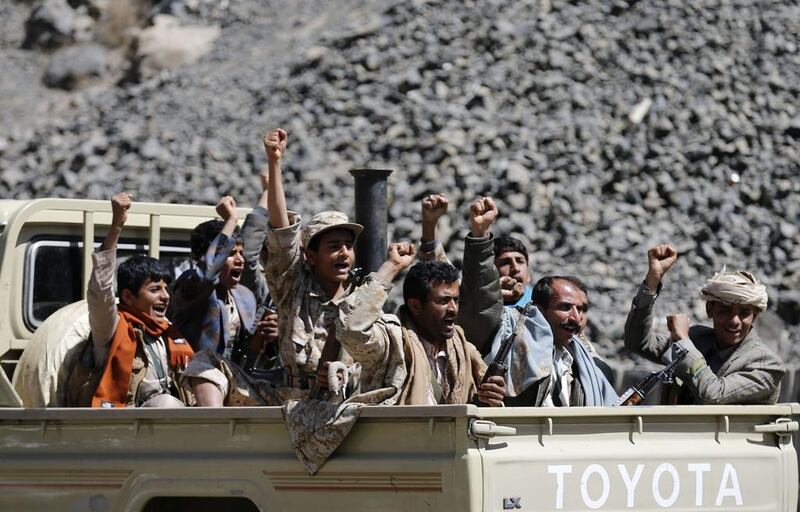CAIRO // The Arab League said it will hold an emergency meeting on Wednesday to discuss the ongoing crisis in Yemen where Shiite Houthi militiamen have taken over the country.
It comes as the UN Security Council is considering a draft resolution calling on the Houthi fighters to step down or face the consequences.
The Arab League’s deputy head Ahmed bin Helli said on Sunday that “the purpose of [Wednesday’s] meeting is to review the recent dangerous developments on the Yemeni scene”.
When asked about the Arab position on the crisis, he said: “It is up to the foreign ministers to declare an Arab stand after studying all the aspects of the crisis.”
The Arab League has previously accused the Houthis of carrying out a “coup” when it ousted the government of former president Abdrabu Mansur Hadi on February 6.
The UN’s draft resolution demands that the Houthis “immediately and unconditionally” withdraw forces from government institutions, release Mr Hadi and his cabinet from house arrest, and engage “in good faith” in UN-led peace talks.
It also calls on UN member states to “refrain from external interference which seeks to foment conflict and instability.”
The draft emerged on Saturday, just two days after UN secretary-general Ban Ki-moon warned that Yemen was “collapsing before our eyes.” Following his comments to the Security Council, Jordan and Britain quickly began working on a resolution.
But the draft falls short of what the Gulf Cooperation Council would like to see.
Overnight on Saturday, the GCC urged the Security Council to take forceful action against the deteriorating security situation in Yemen, demanding that action be taken under Chapter 7 of the UN Charter, which would allow for military intervention.
It warned that if the world fails to act against the Houthis then the six-nation council will take whatever actions it deems necessary to maintain regional security and stability.
However, the group did not elaborate on what these actions might be.
“In the case of failure to reach an agreement ... the GCC member states will take measures which enable them to maintain their vital interests in the security and stability of Yemen,” the foreign ministers of the GCC said in a joint statement following their emergency meeting late on Saturday in Riyadh.
They also demanded the implementation of a UN resolution that imposes sanctions against anyone “hampering the process of peaceful transition of power” and called for urgent action to ensure the safety of former president Mr Hadi, who resigned last month after the Houthis put him under house arrest.
The Houthis responded to the GCC’s comments on Sunday, denouncing as “provocative blackmail” demands for the rebels to relinquish power.
“The Yemeni people won’t cede power in the face of threats,” Houthi spokesman Mohammed Abdulsalam was quoted as saying by the official Saba news agency, which the Shiite militia now controls.
Mr Abdulsalam insisted that Yemenis were “engaged in a process of self-determination free of any (foreign) tutelage”.
At least nine countries have closed their Yemeni embassies over the past few days, including the UAE on Saturday, amid fears of the deteriorating security situation.
The withdrawal of ambassadors “reflects the panic that has hit some political forces which aren’t betting on the people ... and their dignity, but on foreign” countries, said Mr Abdulsalam.
“These embassies are here to oversee the interests of their own countries and not those of the (Yemeni) people,” he added.
The Houthis seized Sanaa in September before tightening their grip and prompting Western-backed Mr Hadi to tender his resignation as president.
The Shiite fighters then dissolved parliament and installed a “presidential council” to run Yemen on February 6.
The Houthi advance has also strengthened the country’s Al Qaeda branch, which is backed by some Sunni tribesmen.
UN-led talks to resolve the crisis continue but have made little ground, with envoy Jamal Benomar telling the Security Council on Thursday that Yemen is at a crossroads between “civil war and disintegration.”
Meanwhile, members of a southern secessionist group kidnapped 10 Yemeni military personnel on Sunday, and are demanding that the army hand over a base in the province of Lahj in exchange for their release, the Al Masdar news website reported.
The abducted men, who include three officers, are based at Al Anad military base, the website reported, citing local officials.
* Agence France-Presse, Associated Press and Bloomberg





